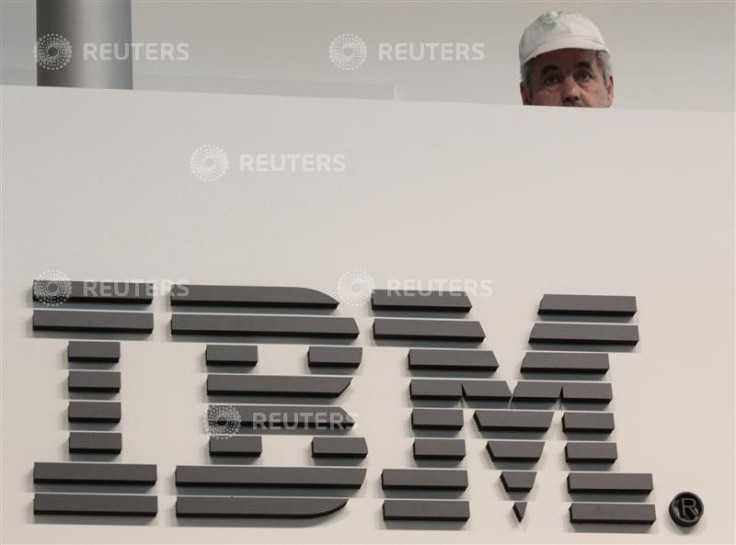IBM Waxes, Microsoft Wanes: Reversal of Fortunes
ANALYSIS

Last week, International Business Machines Corp. (NYSE: IBM) became the second-largest technology company in the world, second only to Apple Inc. (Nasdaq: AAPL).
More importantly, Big Blue supplanted Microsoft (Nasdaq: MSFT) for second place -- marking the first time in fifteen years that IBM surpassed Microsoft in size.
As of Friday’s close, IBM’s market cap amounted to $208.84-billion, just a nudge above Microsoft’s $208.54-billion. (Apple is far ahead at $353.52-billion).
Microsoft itself ceded its top tech spot to Apple just last year.
This crossing of paths might suggest a longer-term trend for these two iconic companies – IBM, once the premier tech corporation in the world decades ago, has somehow engineered a stunning resurgence to prominence; while Microsoft (the darling of tech investors during the 1990s) has been going nowhere.
Consider that since July 1, 2002 (the same year that IBM named Samuel J. Palmisano to replace Louis Gerstner as chief executive) IBM shares have tripled in value, while Microsoft stock has barely budged.
Year-to-date in 2011 through Friday, IBM shares have jumped 18.6 percent, while Microsoft’s valuation has dropped about 11 percent.
Why this divergence in fortunes?
Part of it is due to investor perception, but another part lies with the fact that IBM made some bold steps to reconfigure their entire company, while Microsoft seems stuck and unable (or unwilling) to innovate beyond its core Windows/Office software business.
David Smith, chief investment officer of Rockland Trust Investment Management Group, in Rockland, Mass., said that the dramatic turnaround by IBM may be traced to its audacious decision in May 2005 to unload its famed (but low-margin, commoditized and aging) personal computer business to Lenovo Group Ltd. of China and focus instead on (higher-margin) technology services, business software and premium hardware businesses.
“At the time, the move to sell the PC unit was applauded by Wall Street, but no one could have foreseen how successful IBM would become thereafter,” he told International Business Times.
Indeed, according to reports, IBM derived 44 percent of its pre-tax profit last year from software, up from a 25 percent figure in 2000.
Similarly, Ted Schadler, principal analyst at Forrester Research, told Bloomberg: IBM went beyond technology. They were early to recognize that computing was moving way beyond these boxes [PCs] on our desks.
Under Palmisano’s tenure, IBM has increased its profit figures for more than 30 consecutive quarters.
Palmisano is now looking to invest in the emerging markets, analytics as well as cloud computing, in a bid to generate another $20-billion revenue by 2015.
In a trade show in February, Palmisano spelled out his vision for the future: “Computing is now found in things that no one thinks of as ‘computers’,” he said.
“Today, there are nearly a billion transistors per human, and each one costs one ten-millionth of a cent. Yes, some of these transistors are going into servers, PCs, smart phones, MP3 players and tablets. But an increasing number of them are going into appliances and automobiles, power grids, roadways, railways and waterways.”
Meanwhile, Microsoft which still derives the bulk of its revenues from sales of Windows/Office software which are used in PCs, has largely failed to diversify into new high-growth areas like mobile computing, mobile phones internet search and tablets – thus, slipping far behind high-flying rivals like Apple and Google (Nasdaq: GOOG).
Nonetheless, Microsoft continues to generate huge revenues, despite stockholders’ increasingly disdainful attitude towards the company.
In fact, the company delivered net income to $18.8 billion on revenue of $62.5 billion for the fiscal year ended June 2010, up from net income of $7.35 billion on revenue of $25.3 billion for the 2001 – roughly the span of chief executive Steve Ballmer’s reign.
The company posted almost $70-billion in revenue in the most recent fiscal year.
Still, there are repeated calls for Ballmer to be removed from Microsoft’s throne.
“Microsoft remains a huge cash-flow generator, but the market is not convinced that the company can keep growing, much less compete with the likes of Apple and Google in other high-tech areas,” Smith said.
“Ballmer has been widely blamed for failing to generate much excitement for the company’s future and for failing to present a compelling strategy plan.”
As such, Microsoft shares are amazingly cheap -- the stock currently trades at a forward P/E of about 9.2 (versus 14.2 for IBM, 17.9 for Google, 14.8 for Apple, and a whopping 93.7 for Amazon.com).
Ironically, Microsoft basically got its start from IBM more than thirty years ago when co-founder Bill Gates signed a deal under which IBM would rely on Microsoft to provide an operating system for its new PC. Gates also somehow convinced IBM that his company should retain the rights to the operating system -- thereby, inadvertently launching the wildly successful Windows product line.
Now, it seems, IBM is enjoying the last laugh.
© Copyright IBTimes 2024. All rights reserved.





















